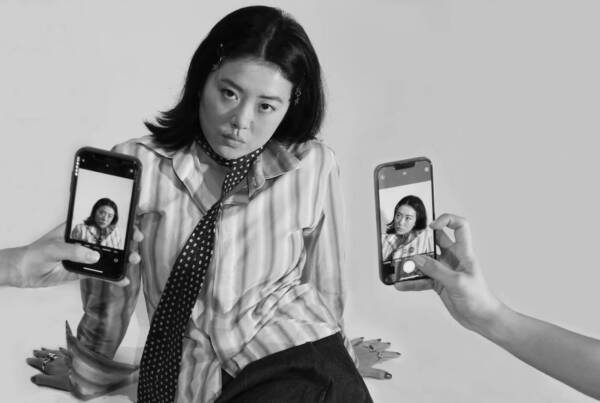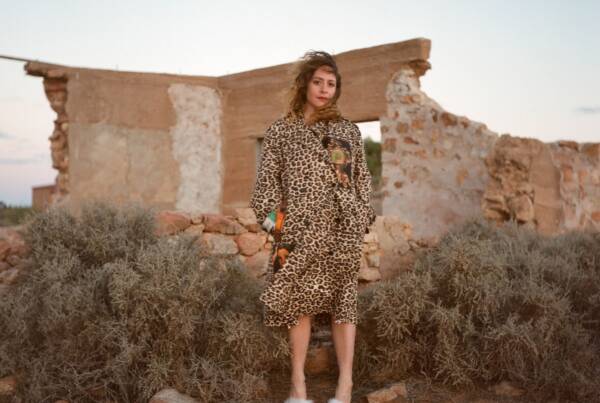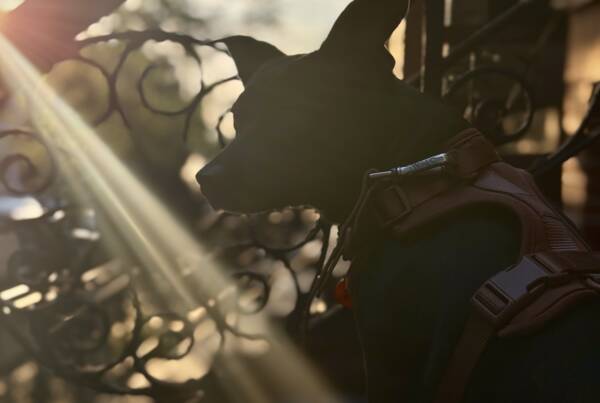Writing by Erandhi Mendis // Photography by Casey Garnsey
Hope Defteros wants you to embrace feeling everything.
“I think there is a big fear, where if you go through something and try [to] process it – that years later if you still think about it and it still has [that] feeling in your chest, that it’s a negative thing? In reality I think that’s a really cool thing because you’re a human – you feel things.”
Known professionally as Hope D, Defteros says this to me with some level of unbridled optimism for being alive. It makes sense, her debut record, released this February, Clash of the Substance is a bombastic, gentle juxtaposition of the messiest, most human feelings.
Artist projects often span years before they are shared with the world, and Clash is no different – “the oldest song on there I’m pretty sure is five nearly six years old, which is Emerald,” she says of the funk heavy opening track.
Melodically adventurous, Defteros seems to have a pragmatic approach to revisiting seasons of her life. While many lyrics have been a long time coming, the album does not feel dated in any way – largely due to a wholehearted acceptance of the ebbs and flows of life that translates into her music.
“Coming back to [older songs] to actually record – it’s amazing that things are still so relevant and can still strike a massive chord or I haven’t learnt from that lesson yet.”
In many ways, learning (or the acceptance of not learning) is a pillar of Clash. It reads as a concept record, a time capsule of intricate adolescence. Sex, drugs and rock and roll feels too brash of a description – it’s more nuanced: a rollercoaster of addiction, breakups, everyday life and dizzying highs. With bass lines that harken to 2011 Arctic Monkeys and satisfying guitar moments reminiscent of early Ed Sheeran, the production complements how Hope navigates years of work into one cohesive soundscape.
“I’m a huge fan of Frank Ocean’s Orange” she says when I ask about the various interludes on the record. “I wanted to make them a priority. It felt natural to build the album around [the interludes]. It tells a story that way. All of the songs [on the album] were written at random times in my life, so they do have different influences. My biggest influence, which you probably can’t tell, is Hozier – but the delivery of the songs is Hobo Johnson. He speaks and raps and really trips over his words.”
Tripping over words is something Defteros has crafted into her own unique sound, particularly when playing live. “I’ve been dying to release Clash because I’ve been playing [some of these tracks] live for years. Playing live is my favourite part – which probably reflects on how long it’s taken me to record and put out this album… because I’ve been having so much fun playing it.”
This strikes me as interesting because of how personal the record is, sharing art so vulnerable seems to almost be an out of body experience for Hope. Yet, she confides that nerves are always still part of the creative process.
“There is a song called Fragile which starts with me talking about my experiences with school. I’m still good friends with people from school so I’ve been really nervous to release this one because I’d never want them to think that I didn’t enjoy their company or didn’t feel like we were friends. But it’s just a different time and I’m sharing my experience – they’re true lyrics so I didn’t want to not put it in.”
“As a kid listening to people write songs about really personal situations in their lives. I would think how are they able to put this out? Because obviously the people that the songs are about are listening to them. But if you hold that part back you’re never really gonna release honest or maybe even good music because you’re always walking on eggshells.”
A faithfulness to truth lies at the heart of Hope’s work. Not only in personal, “scary and nerve wracking” songwriting – but also in highlighting the mundane comedy of everyday life.
“Muffin of the Day was my second song co-writing with Aidan Hogg who produced the whole album. He asked what I wanted to write about and I had just come from work – should we write about working at a cafe? We just started making the tune and it was cool to write about a hospitality job. It became very comical and very true. All those things were so real for me, missing your alarm and having nightmares. All the cleaning and there’s so many babies! I’m really close with my boss at the cafe and was really nervous to show her but she was pissing herself laughing – she loved it.”
Check out Muffin of the Day on Ramona’s Weekly Playlist
The effortlessness with which Defteros dives into pithy observations about past memories is a hallmark of her craft. “I find it really easy to go back into my memory in certain situations or experiences and I can genuinely really feel what I felt at the time. And that’s what I mean, even if they’re still painful it doesn’t mean it’s a bad thing. If anything it’s a great thing for me because I’m able to rip it apart and write lyrics that sound like I wrote it as it was happening.
It’s been a journey to the feeling of comfort in chaos on Clash. Sharing such exposed songwriting once felt out of reach for Defteros.
“Growing up, I was at an all girls private school and there were no queer people who were out. I was very hidden in the closet and it just felt really cold and alienating. The only thing that gave me joy and release was looking up queer youtubers or short queer films and music from people around the world. And I was like how can they be so confident releasing this? It’s so scary.”
Pushing past the fear of being othered, singled out – sharing one’s truth – is now very obviously a virtue of her artist project.
“I feel like it’s so important to be diverse and I think I was quite blind to it all. The first time I noticed [lack of representation] I was playing someone’s single launch where there were about 5 bands and I noticed I was the only female. And I just thought damn that sucks, wouldn’t that be nice if there were more of us? It sucked because it felt unwanted or not needed even though I know it’s so needed. So that it’s not just straight white male bands playing, which is fine but bringing in people who don’t identify like that is so important because it gives a voice to those groups and empowers people listening.”
Empowering others has been a byproduct of both Clash and Defteros’ previous work. Notably, her first release, Swim, has proved a consistently safe place for people struggling with their sexuality.
“That was a really scary one to release (Swim). I hadn’t even properly come out to a lot of people including some of my family. The reason I put that out as my first single was because when I wrote it it really struck a chord with me. It was the most right song I had ever written – [swim] felt so correct. It gave me such a massive boost in my journey and process – releasing it, my hope was that it could do the same for someone else. It came out in 2019 and I still get messages now saying how much that helped them come out. It just means the world to me because that was exactly what I wanted to achieve by putting out that song.”
Finding strength in sharing all facets of life is a consistent theme on Clash of the Substance, where Defteros is the first to admit that growing up is messy.
But, hope by name and hope by nature – she is wholeheartedly encouraging us all to dive in and embrace being human: just feel your way through.
Clash of the Substance is out now everywhere you listen to music.







